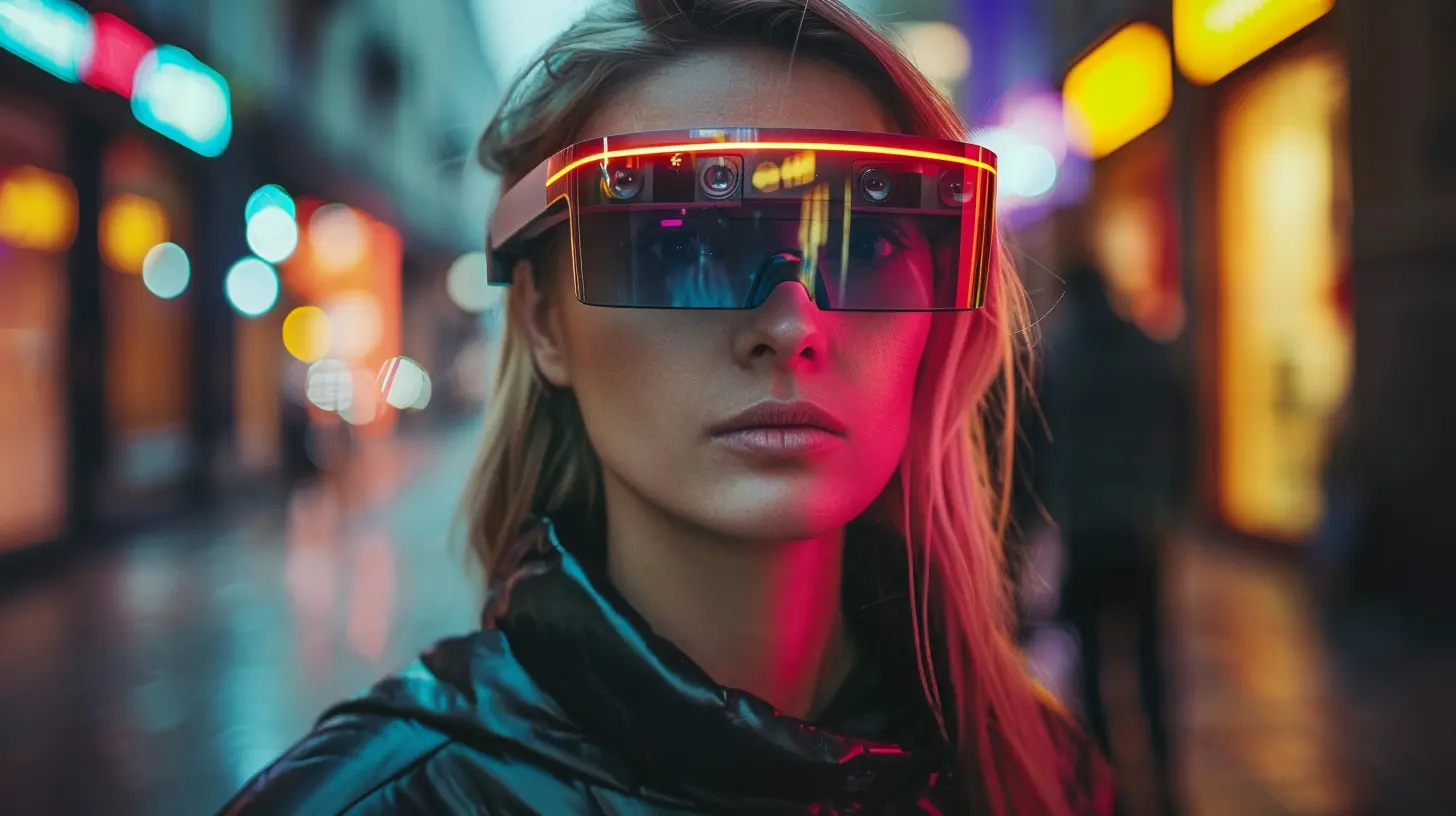The Influence of AR Glasses on Consumer Behavior and Buying Trends
22 April 2025
Augmented reality (AR) glasses are shaking things up in ways we never imagined. From redefining how we shop to changing the way brands interact with us, these futuristic gadgets are transforming consumer behavior and reshaping buying trends. But how exactly are AR glasses influencing the market? Let’s dive in.

The Rise of AR Glasses in Everyday Life
Remember when AR felt like a sci-fi fantasy? Well, not anymore. With companies like Apple, Meta, and Google doubling down on AR glasses, it's clear they're here to stay.These smart glasses blend digital content into our real-world experiences, offering hands-free access to information, product details, and even virtual shopping assistants. Whether it's trying on shoes before buying or getting guided navigation in a new city, AR glasses are making life more immersive and interactive.

How AR Glasses Are Changing Consumer Behavior
Tech always impacts how we think and act, and AR glasses are no exception. Here’s how they’re reshaping consumer habits:1. Enhancing the Online Shopping Experience
Online shopping has always had one drawback—uncertainty. Will that jacket look good on me? Will that couch fit in my living room? With AR glasses, virtual try-ons solve these concerns instantly.- Need new sunglasses? See how they look on your face in real time.
- Choosing furniture? Place the virtual version in your living space before buying.
- Buying makeup? Test different shades on your skin without stepping into a store.
This added confidence in purchasing decisions means fewer returns and more satisfied customers.
2. Encouraging Impulse Buying
Let’s be honest—retailers love impulse buyers. AR glasses make it even easier to make snap purchasing decisions. Instead of scrolling through a website, consumers can interact with products in real-world environments.A simple glance at a product could trigger an instant pop-up with reviews, customization options, and a one-click buy button. That seamless experience makes purchases feel effortless, often leading to more sales.
3. Boosting Brand Engagement
Brands are always looking for new ways to stand out, and AR glasses are giving them a fresh opportunity. Imagine walking down the street and receiving personalized deals in real time as you pass a store.Retailers can use AR to:
- Push location-based discounts.
- Offer interactive advertisements that customers can engage with.
- Create virtual storefronts shoppers can browse anytime, anywhere.
This level of engagement keeps brands top-of-mind and strengthens customer loyalty.
4. Changing How Consumers Research Products
Gone are the days of Googling product reviews before buying. AR glasses allow consumers to see instant reviews, tutorials, and price comparisons right in front of them.- Walk into a store, glance at a phone, and see ratings pop up.
- Look at a product, and AR could show how it works in action.
- Compare prices and find better deals without searching manually.
This streamlines the research process, making informed purchasing decisions quicker and easier.
5. Reducing the Need for In-Store Shopping
While some people enjoy the in-store shopping experience, AR glasses could make it less necessary. Why visit a store when you can get the same experience at home?With virtual showrooms and try-ons, consumers don’t need to travel unnecessarily. This is especially valuable for industries like fashion, beauty, and home decor, where seeing a product “in real life” matters.

Emerging Buying Trends Fueled by AR Glasses
With AR glasses gaining popularity, we’re seeing new shopping trends emerge. Let’s break down the key ones.1. Rise in Personalized Shopping
Shopping is becoming more tailored than ever. With AR glasses, personalized recommendations based on past purchases, preferences, and location are the new norm.Expect AI-driven personal stylists, customized product suggestions, and even curated shopping lists—all displayed right in front of consumers’ eyes.
2. A Shift Toward Experiential Purchases
People value experiences over material things, and AR is fueling this shift. Instead of just buying a product, consumers want to engage with it.For example:
- Travel agencies could offer virtual previews of destinations.
- Car dealerships could provide immersive test drives.
- Beauty brands could create personalized skincare consultations without a human salesperson.
The more immersive the experience, the more likely consumers are to buy.
3. Greater Adoption of “Try Before You Buy”
Consumers are becoming more cautious with their spending. AR glasses make “try before you buy” more accessible, offering a preview of products before committing.This trend is particularly strong in industries like:
- Fashion (virtual fitting rooms)
- Home decor (visualizing furniture in rooms)
- Wearables (trying different smartwatch styles)
Retailers who adopt this strategy will likely see fewer returns and more sales.
4. The Rise of Contactless Shopping
With AR glasses providing product information, reviews, and purchase options—all hands-free—consumers don’t need to touch products before buying.This shift is especially relevant post-pandemic, where hygiene concerns are still present. Expect more brands to adopt AR-powered contactless shopping experiences.
5. Increased Influence of Social Commerce
Influencers and social media have already changed the shopping game, and AR glasses take it a step further. Imagine watching an influencer’s video and instantly seeing a “Try Now” option appear in your field of view.Brands can integrate AR into platforms like Instagram, TikTok, and Snapchat, making social commerce more interactive and engaging than ever before.

Potential Challenges of AR Glass Adoption
Despite all the perks, AR glasses face some hurdles:- Cost: High-end AR glasses aren’t cheap, limiting accessibility.
- Privacy Concerns: Constant data collection could make some users uneasy.
- Social Acceptance: Wearing AR glasses in public still feels a bit "out there" for many people.
As the tech evolves and becomes more mainstream, these issues are likely to decrease.
Final Thoughts
AR glasses are more than just a cool gadget—they’re a game changer for consumer behavior and shopping trends. From virtual try-ons to personalized shopping experiences, these devices redefine how we interact with brands and make purchasing decisions.As adoption grows, businesses that embrace AR technology will have a serious competitive edge. So, are you ready to shop in a world where reality and digital seamlessly blend? The future is closer than we think.
all images in this post were generated using AI tools
Category:
Ar GlassesAuthor:

Gabriel Sullivan
Discussion
rate this article
8 comments
Marigold McCollum
Great insights! AR glasses truly reshape our shopping experience.
May 9, 2025 at 8:00 PM

Gabriel Sullivan
Thank you! I'm glad you found the insights valuable—AR glasses are indeed revolutionizing how we shop!
Stephanie McInerney
What an exciting exploration of AR glasses' impact on shopping! It's amazing to see how technology transforms consumer experiences and buying habits. The future looks bright and innovative—can't wait for what's next! 🌟
May 3, 2025 at 3:32 AM

Gabriel Sullivan
Thank you for your enthusiasm! It's thrilling to see how AR glasses are reshaping consumer experiences and the future of shopping. Stay tuned for more innovations ahead! 🌟
Andrea Vance
AR glasses are revolutionizing consumer interaction, driving engagement and reshaping buying trends. Embracing this technology is essential for staying competitive in today's market.
May 2, 2025 at 1:01 PM

Gabriel Sullivan
Thank you for your insight! AR glasses indeed have the potential to transform consumer behavior, enhancing engagement and shaping new buying trends. Embracing this technology is crucial for businesses looking to remain competitive.
Harvey McGonagle
This article sheds light on the transformative impact of AR glasses on consumer behavior. It's fascinating how augmented reality enhances shopping experiences, making them more interactive and personalized. However, the potential for over-reliance on technology raises questions about genuine engagement and the essence of human connection in retail.
April 28, 2025 at 6:18 PM

Gabriel Sullivan
Thank you for your insightful comment! I agree that while AR glasses can enhance shopping experiences, we must remain mindful of the balance between technology and authentic human interactions in retail.
Stacey McPhee
Exciting times ahead! AR glasses will transform shopping experiences for everyone!
April 26, 2025 at 10:37 AM

Gabriel Sullivan
Absolutely! AR glasses have the potential to revolutionize how we shop, making experiences more immersive and personalized. Exciting prospects indeed!
Sarah McCollum
AR glasses will transform consumer interactions, blending the digital and physical worlds, ultimately reshaping buying decisions and experiences.
April 24, 2025 at 4:32 AM

Gabriel Sullivan
Thank you for your insight! AR glasses indeed have the potential to revolutionize how consumers engage with products, creating immersive experiences that significantly influence buying decisions.
Ace Gilbert
AR glasses could be the fun twist our shopping experiences need—exciting times ahead!
April 23, 2025 at 11:30 AM

Gabriel Sullivan
Absolutely! AR glasses have the potential to enhance interactivity and personalization in shopping, transforming how consumers engage with products. Exciting advancements are indeed on the horizon!
Alexa McNab
AR glasses are revolutionizing how we shop! Embrace this tech to enhance your experience and discover new possibilities!
April 22, 2025 at 12:50 PM

Gabriel Sullivan
Thank you for your insight! AR glasses indeed open new avenues for shopping, enhancing consumer engagement and shaping buying trends.
MORE POSTS

Best Practices for Securing Your Data in the Cloud

The Intersection of IoT and Data Analytics

The Evolution of Antivirus Software: Is It Still Enough?

How Retailers Use Data Analytics to Boost Customer Experience

Nintendo Switch vs. Steam Deck: Which Handheld Gaming Console is Better?

Fitness vs. Smartwatch: Which Wearable is Best for You?